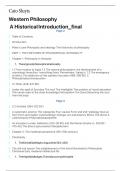Summary
historical introduction to philosophy book summary
- Course
- Institution
- Book
With this you'll get a clear overview of what the general gesture of each lecture/chapter is about, helping you see the complete subject matter more clearly, and forming a great basis for revising. book: western philosophy, a historical introduction
[Show more]




